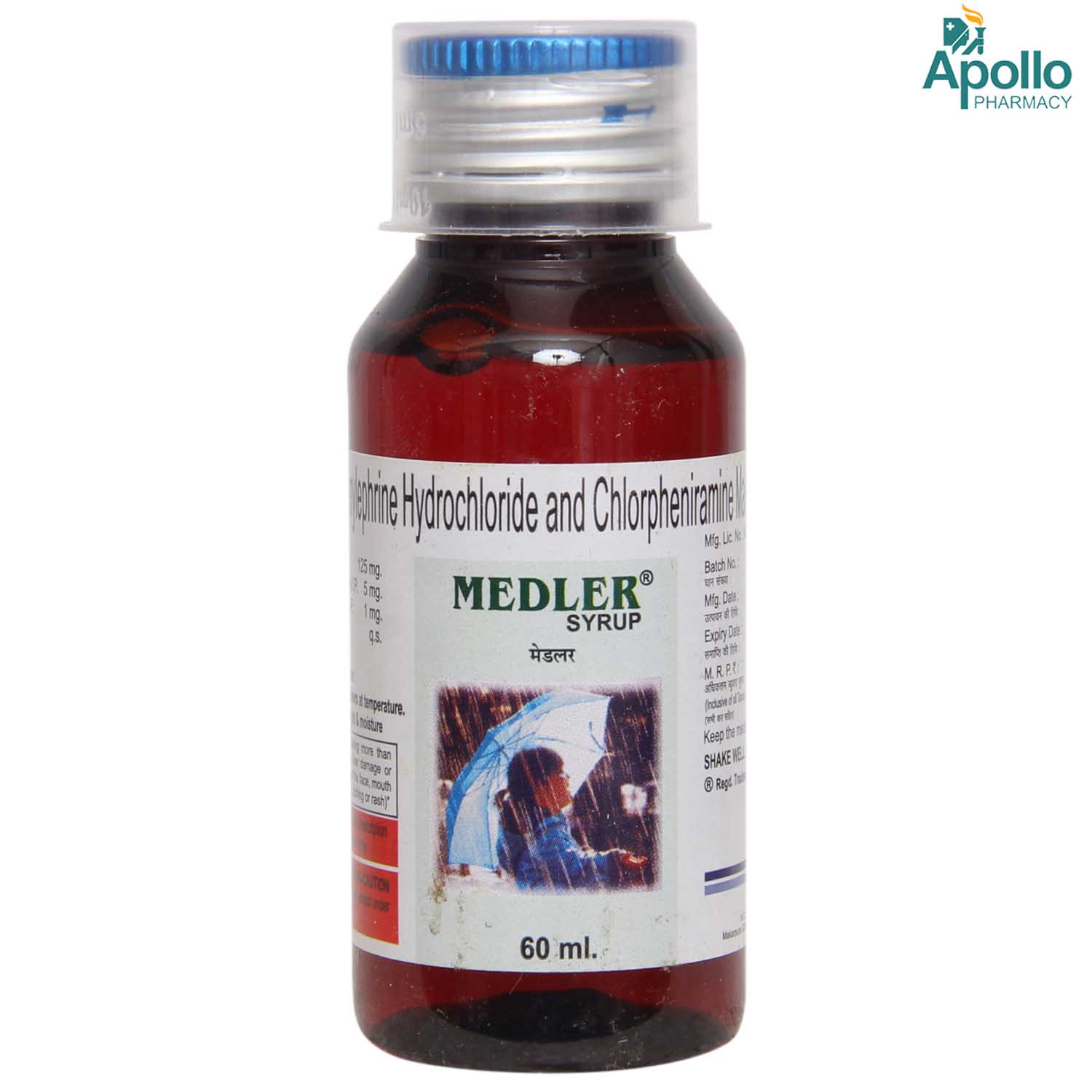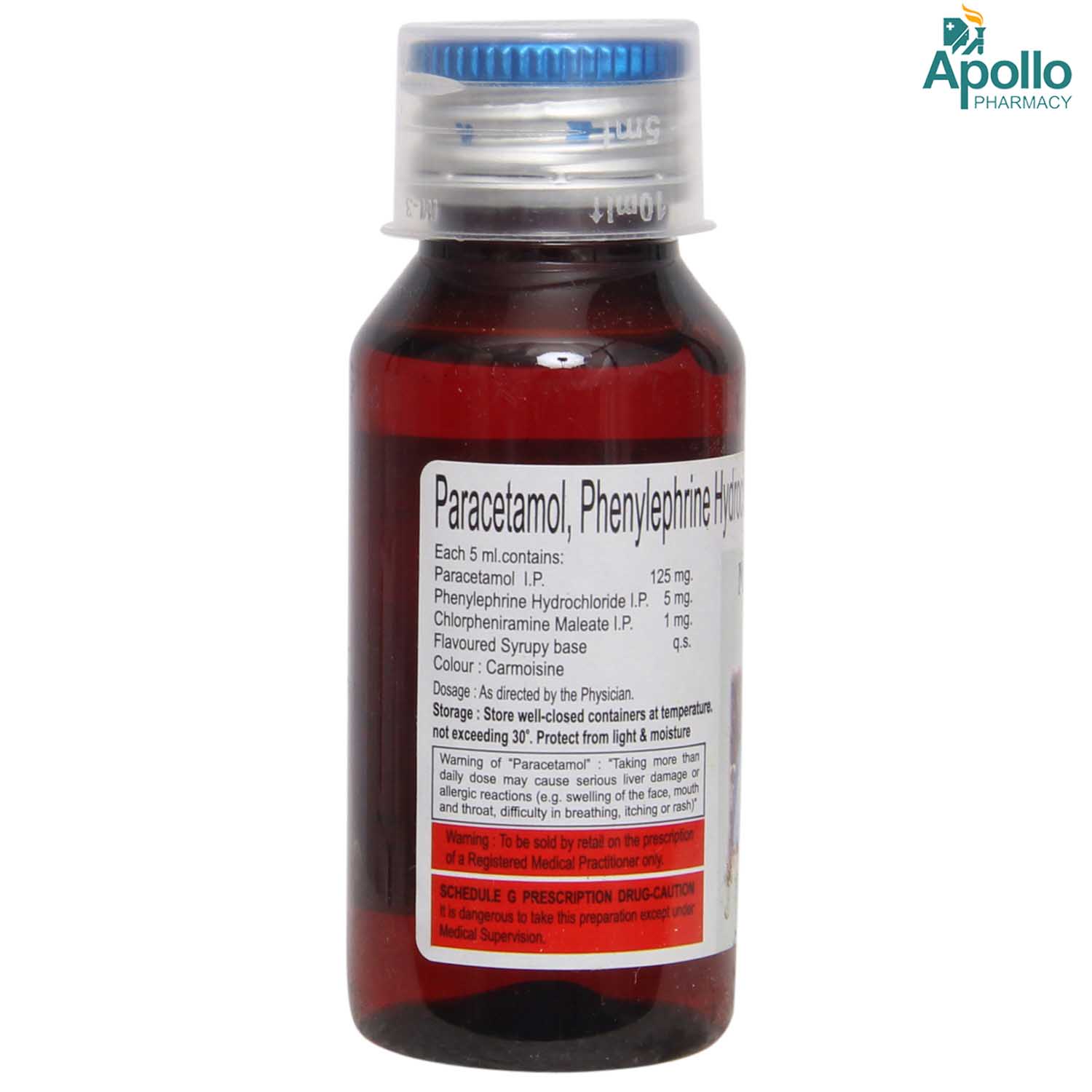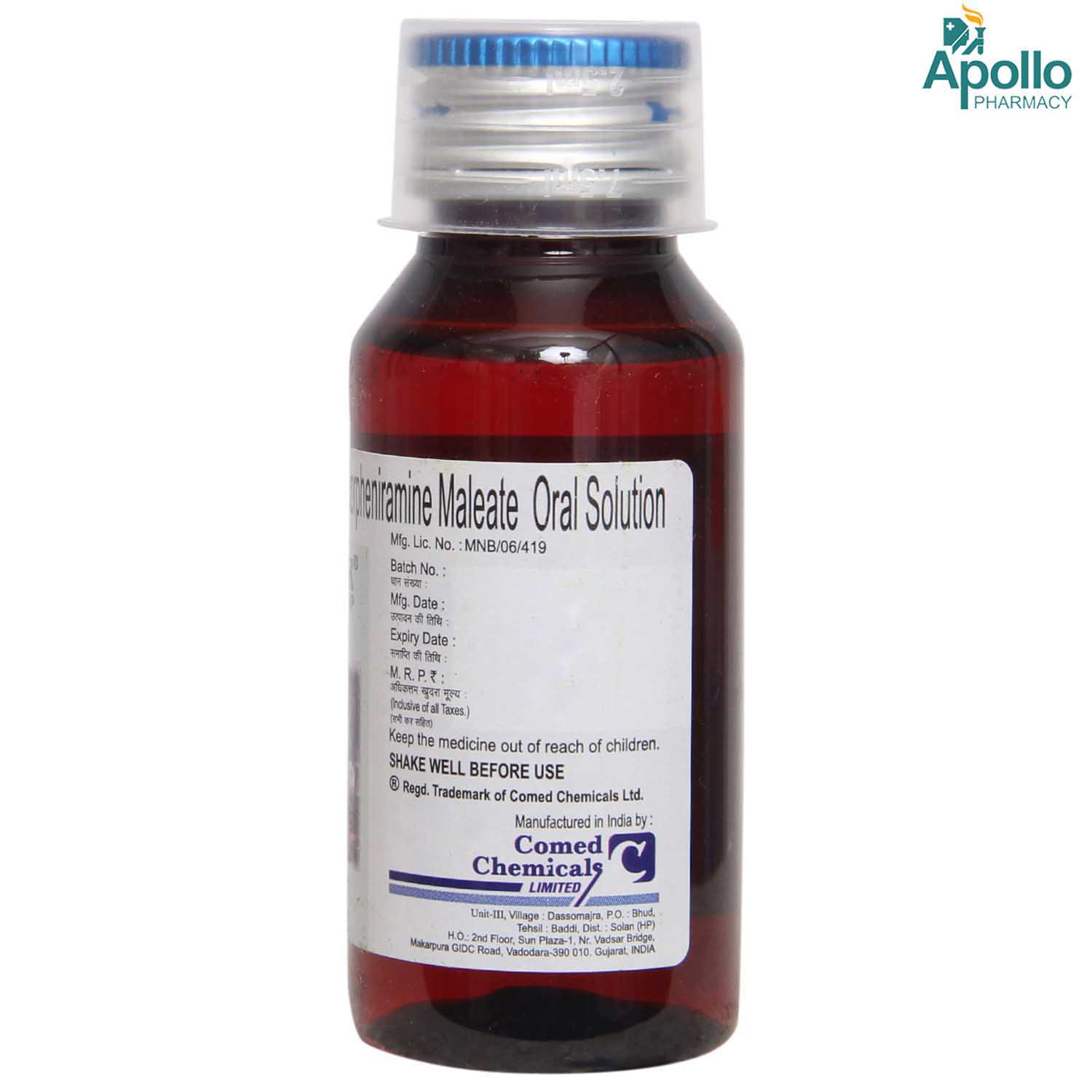Medler Syrup



MRP ₹71
(Inclusive of all Taxes)
₹10.7 Cashback (15%)
know your delivery time
Provide Delivery Location
Manufacturer/Marketer :
Consume Type :
Expires on or after :
Return Policy :

Secure Payment

Trusted by 8 Crore Indians

Genuine Products
Therapeutic Class
Country of origin
Manufacturer/Marketer address
FAQs
Disclaimer
Alcohol
Safe if prescribed
Avoid consumption of alcohol with Medler Syrup as it may increase the risk of liver damage and cause increased drowsiness, dizziness or difficulty concentrating. Please consult a doctor before consuming alcohol with Medler Syrup.
Pregnancy
Consult your doctor
It is not known whether Medler Syrup is safe to be used in pregnancy. If you are pregnant, consult your doctor before taking this medicine.
Breast Feeding
Consult your doctor
Medler Syrup may be excreted in breast milk and cause harm to the baby. Besides this, Medler Syrup may also slow milk production. Hence, if you are breastfeeding, consult your doctor before taking this medicine.
Driving
Safe if prescribed
Medler Syrup may cause blurred vision or impair thinking in some people. Therefore, drive only if you are alert after taking Medler Syrup.
Liver
Consult your doctor
Medler Syrup has acetaminophen, which may causes harm to the liver in doses more than the recommended dose. Take Medler Syrup with caution, especially if you have a history of liver diseases/conditions. Your doctor may adjust the dose based on your condition.
Kidney
Consult your doctor
Take Medler Syrup with caution, especially if you have a history of kidney diseases/conditions. Your doctor may adjust the dose based on your condition.
Children
Safe if prescribed
Medler Syrup is not recommended for children below 4 years of age as the safety and efficacy are not established.
Reference
- https://www.drugs.com/mtm/acetaminophen-chlorpheniramine-and-pseudoephedrine.html
- https://clinicaltrials.gov/ct2/show/results/NCT02246166
- https://www.drugs.com/mtm/acetaminophen-chlorpheniramine-and-pseudoephedrine.html#:~:text=Acetaminophen%2C%20chlorpheniramine%2C%20and%20pseudoephedrine%20is,common%20cold%2C%20or%20the%20flu.
About Medler Syrup
Medler Syrup belongs to the class of medication called 'cough and cold medications' primarily used to treat symptoms of the common cold and allergies like sneezing, runny/stuffy nose, fever, headache, body pains, congestion or watery eyes. The common cold is a respiratory illness affecting the nose and throat. It is mostly caused by viruses known as 'rhinovirus.' The virus enters the body through the nose, mouth or eyes and spreads easily through droplets in the air when the person who is sick sneezes, coughs or talks.
Medler Syrup is a combination medicine that contains Acetaminophen (mild analgesic and antipyretic), Pseudoephedrine (decongestant) and Chlorpheniramine (antihistamine/antiallergic). Acetaminophen works by blocking the production of certain chemical messengers in the brain known as prostaglandins responsible for pain and fever. Pseudoephedrine works by contracting and narrowing the small blood vessels of nasal passages and airways, relieving congestion or stuffiness in the nose. Chlorpheniramine works by blocking the action of histamine, a substance responsible for causing allergic reactions. Collectively, Medler Syrup helps relieve allergy symptoms such as sneezing, running nose, watery eyes, itching, swelling and nasal congestion.
Take Medler Syrup as prescribed by your doctor. Your doctor will recommend how often you take Medler Syrup based on your medical condition. Some people may experience nausea, sleepiness, allergic reaction, dizziness, headache, restlessness, nervousness, and insomnia (difficulty sleeping). Most of these side effects of Medler Syrup do not require medical attention and gradually resolve over time. However, if the side effects persist or worsen, please consult your doctor.
If you are allergic to Medler Syrup or any other medicines, please tell your doctor. Please do not take more than the prescribed dose of Medler Syrup as it may cause liver damage and can be lethal. If you have high blood pressure, diabetes, glaucoma, hyperthyroidism (overactive thyroid), kidney, liver, heart or urinary problems, inform your doctor before taking Medler Syrup. If you are pregnant, it is advised to inform your doctor before using Medler Syrup. Do not use Medler Syrup in breastfeeding mothers without a doctor’s advice as it may be excreted in breast milk and cause harm to the baby. Medler Syrup is not recommended for children below 4 years.
Uses of Medler Syrup
Medicinal Benefits Mweb
Key Benefits
Medler Syrup belongs to the class of medication called 'cough and cold medications' primarily used to treat symptoms of the common cold and allergies like sneezing, runny/stuffy nose, fever, headache, body pains, congestion or watery eyes. Acetaminophen is an analgesic (relieves pain) and antipyretic (reduces fever) that works by blocking the production of certain chemical messengers in the brain known as prostaglandins responsible for pain and fever. Pseudoephedrine is a decongestant that works by contracting and narrowing the small blood vessels of nasal passages and airways, relieving congestion or stuffiness in the nose. Chlorpheniramine belongs to the class of antihistamines (anti-allergic drugs) that works by blocking the action of histamine, a substance responsible for causing allergic reactions. It helps relieve allergy symptoms such as sneezing, running nose, watery eyes, itching, swelling and nasal congestion.
Directions for Use
Side Effects of Medler Syrup
- Dizziness
- Drowsiness
- Mild headache
- Blurred vision
- Dry mouth, nose, or throat
- Constipation
- Feeling nervous
- Sleep problems
Drug Warnings
If you are allergic to Medler Syrup or any other medicines, please tell your doctor. If you are pregnant, it is advised to inform your doctor before using Medler Syrup. Do not use Medler Syrup in breastfeeding mothers without a doctor’s advice as it may be excreted in breast milk and cause harm to the baby. Medler Syrup is not recommended for children below 4 years. Please do not take more than the prescribed dose of Medler Syrup as it may cause liver damage and can be lethal. If you have high blood pressure, diabetes, glaucoma, hyperthyroidism (overactive thyroid), chronic bronchitis, asthma, chronic obstructive pulmonary disease (COPD), blockage in stomach or intestines, enlarged prostate gland, pheochromocytoma (tumour in the adrenal glands), kidney, liver, heart or urinary problems, inform your doctor before taking Medler Syrup.
Drug-Drug Interactions
Drug-Drug Interactions
Login/Sign Up
Taking Medler Syrup 60 ml with Propofol may lead to increased levels of Medler Syrup 60 ml leading to side effects like high blood pressure.
How to manage the interaction:
Taking Medler Syrup 60 ml with Propofol is not recommended, but it can be taken if prescribed by the doctor. Do not discontinue the medications without consulting a doctor.
Taking Furazolidone with Medler Syrup 60 ml can cause an increase in high blood pressure.
How to manage the interaction:
Taking Furazolidone with Medler Syrup 60 ml is not recommended, it can be taken if prescribed by the doctor. However, if you experience sudden and severe headache, blurred vision, confusion, seizures, chest pain, nausea or vomiting, sweating, lightheadedness, fainting, sudden numbness or weakness (especially on one side of the body), speech difficulties, fever, consult the doctor immediately. It is advised to use Medler Syrup 60 ml only after 14 days of stopping Furazolidone.
Co-administration of Medler Syrup 60 ml with Sevoflurane can increase the levels of Medler Syrup 60 ml and lead to side effects.
How to manage the interaction:
Taking Medler Syrup 60 ml with Sevoflurane is not recommended, it can be taken if prescribed by the doctor. Do not discontinue the medications without consulting a doctor.
Taking Tranylcypromine with Medler Syrup 60 ml can increase the risk of high blood pressure.
How to manage the interaction:
Taking Tranylcypromine with Medler Syrup 60 ml is not recommended, but can be taken together if prescribed by a doctor. However, consult a doctor if you experience severe headache, blurred vision, confusion, seizures, chest pain, nausea or vomiting, sudden numbness or weakness (especially on one side of the body), speech difficulties, fever, sweating, lightheadedness, and fainting Do not discontinue any medications without consulting a doctor.
Co-administration of Selegiline with Medler Syrup 60 ml together can raise blood pressure.
How to manage the interaction:
Taking Selegiline with Medler Syrup 60 ml is not recommended, it can be taken together if prescribed by a doctor. However, consult a doctor immediately if you experience any symptoms such as severe headache, blurred vision, confusion, fits, chest pain, nausea or vomiting, sudden numbness or weakness (especially on one side of the body), speech difficulties, fever, sweating, lightheadedness, and/or fainting Do not discontinue any medications without consulting a doctor.
Taking Medler Syrup 60 ml and Potassium citrate (in tablet or capsule form) together can increase the risk of stomach ulcers, bleeding, and gastrointestinal injury.
How to manage the interaction:
Taking Medler Syrup 60 ml with Potassium citrate is not recommended as it can lead to an interaction, it can be taken if prescribed by the doctor. However, if you experience any symptoms such as severe stomach pain, bloating, lightheadedness or dizziness, nausea, vomiting (especially with blood), decreased hunger, or dark, tarry stools, consult the doctor immediately. Do not discontinue any medications without a doctor's advice.
Taking Medler Syrup 60 ml and Potassium chloride (in tablet or capsule form) together can increase the risk of stomach ulcers, bleeding, and gastrointestinal injury.
How to manage the interaction:
Taking Medler Syrup 60 ml with Potassium chloride it not recommended as it can lead to an interaction, it can be taken if your doctor has prescribed it. However, if you experience any symptoms such as severe stomach pain, bloating, lightheadedness or dizziness, nausea, vomiting (especially with blood), decreased hunger, or dark, tarry stools, consult the doctor. Do not discontinue any medications without a doctor's advice.
Co-administration of Topiramate can cause increased body temperature and decreased sweating, and these effects may be worsened when combined with medications like Medler Syrup 60 ml.
How to manage the interaction:
Although there is a possible interaction between Medler Syrup 60 ml and Topiramate, you can take these medicines together if prescribed by your doctor. However, if you experience any unusual symptoms, consult the doctor. Do not discontinue any medications without consulting a doctor.
Co-administration of Medler Syrup 60 ml with Halothane may increase the risk of an irregular heart rhythm.
How to manage the interaction:
Although taking Medler Syrup 60 ml with Halothane together can result in an interaction, it can be taken if a doctor has prescribed it. However, if you experience any symptoms like lightheadedness, fainting, irregular heart beat, dizziness, consult the doctor. Do not discontinue any medications without a doctor's advice.
Co-administration of Nortriptyline with Medler Syrup 60 ml may lead to side effects like increased blood pressure.
How to manage the interaction:
Although taking Nortriptyline and Medler Syrup 60 ml together can result in an interaction, it can be taken if a doctor has prescribed it. Regular monitoring of blood pressure is advised. Do not discontinue any medications without a doctor's advice.
Drug-Food Interactions
Drug-Food Interactions
Login/Sign Up
Drug-Diseases Interactions
Drug-Diseases Interactions
Login/Sign Up
Drug-Drug Interactions Checker List
- DULOXETINE
- ESCITALOPRAM
- RAMELTEON
- IBUPROFEN
- PHENYTOIN
- CARBAMAZEPINE
- ATENOLOL
- PROPRANOLOL
Habit Forming
Special Advise
- Do not give Medler Syrup to children below 4 years of age.
- Do not take Medler Syrup for longer than 7 days in a row (for adults) and 5 days (for children above 4 years).
- If you have allergic skin reactions like skin redness or rash that spreads and causes blistering and peeling, immediately contact a doctor.
- Patients with glaucoma or benign prostatic hyperplasia (BPH) should use this medicine with caution.
- Consult your doctor if you face any problems while using Medler Syrup.
Diet & Lifestyle Advise
- Wash your hands with soap and water regularly to prevent the spread of germs.
- Eat plenty of foods rich in good bacteria, like yoghurt to improve overall health.
- Drink plenty of fluids to avoid dehydration.
- Gargle with salt water for relief from sore throat.
- Avoid alcohol consumption with Medler Syrup as it may cause tiredness, drowsiness or lack of concentration.
All Substitutes & Brand Comparisons

Have a query?
Buy best Respiratory System products by
Cipla Ltd
Lupin Ltd
Glenmark Pharmaceuticals Ltd
Sun Pharmaceutical Industries Ltd
Alkem Laboratories Ltd
Macleods Pharmaceuticals Ltd
Mankind Pharma Pvt Ltd
Zydus Healthcare Ltd
Leeford Healthcare Ltd
Dr Reddy's Laboratories Ltd
Zydus Cadila
Abbott India Ltd
Intas Pharmaceuticals Ltd
Alembic Pharmaceuticals Ltd
German Remedies Ltd
Centaur Pharmaceuticals Pvt Ltd
Ipca Laboratories Ltd
Aristo Pharmaceuticals Pvt Ltd
Pristine Pearl Pharma Pvt Ltd
Wockhardt Ltd
GlaxoSmithKline Pharmaceuticals Ltd
Zuventus Healthcare Ltd
Koye Pharmaceuticals Pvt Ltd
Micro Labs Ltd
Blue Cross Laboratories Pvt Ltd
Medishri Healthcare Pvt Ltd
Med Manor Organics Pvt Ltd
Indiabulls Pharmaceuticals Pvt Ltd
Adonis Laboratories Pvt Ltd
FDC Ltd
Fourrts India Laboratories Pvt Ltd
Tablets India Ltd
J B Chemicals & Pharmaceuticals Ltd
Shreya Life Sciences Pvt Ltd
Divine Savior Pvt Ltd
Indoco Remedies Ltd
Seagull Pharmaceutical Pvt Ltd
Yash Pharma Laboratories Pvt Ltd
Torque Pharmaceuticals Pvt Ltd
Uniza Healthcare Llp
Wings Pharmacuticals Pvt Ltd
Biological E Ltd
Corona Remedies Pvt Ltd
Icarus Health Care Pvt Ltd
Steris Healthcare
Apex Laboratories Pvt Ltd
Geno Pharmaceuticals Pvt Ltd
Navil Laboratories Pvt Ltd
Precept Pharma
Aar Ess Remedies Pvt Ltd
La Renon Healthcare Pvt Ltd
Torrent Pharmaceuticals Ltd
Astra Zeneca Pharma India Ltd
Biochem Pharmaceutical Industries Ltd
Comed Chemicals Ltd
Entod Pharmaceuticals Ltd
Franco Indian Pharmaceuticals Pvt Ltd
Healthgate Pvt Ltd
Intra Life Pvt Ltd
Megma Healthcare Pvt Ltd
Pfizer Ltd
RPG Life Sciences Ltd
Unipark Biotech Pvt Ltd
Votary Laboratories (India) Ltd
Wanbury Ltd
Brinton Pharmaceuticals Ltd
Dolvis Bio Pharma Pvt Ltd
Eisen Pharmaceutical Co Pvt Ltd
Group Pharmaceuticals Ltd
Knoll Pharmaceuticals Ltd
Morepen Laboratories Ltd
Panacea Biotec Ltd
Prevego Healthcare & Research Pvt Ltd
Rnd Laboratories Pvt Ltd
Sanatra Healthcare Ltd
Skn Organics Pvt Ltd
Stedman Pharmaceuticals Pvt Ltd
Thuyam Life Pvt Ltd
Timon Pharmaceuticals Pvt Ltd
Aglowmed Pharmaceuticals Ltd
Ajanta Pharma Ltd
Alniche Life Sciences Pvt Ltd
Bio Warriors Pharmaceucticals Pvt Ltd
Biochemix Health Care Pvt Ltd
Cadila Healthcare Ltd
Cadila Pharmaceuticals Ltd
Caplet India Pvt Ltd
Chemo Healthcare Pvt Ltd
Delcure Life Sciences Ltd
East West Pharma India Pvt Ltd
Elder Pharmaceuticals Ltd
Embiotic Laboratories (P) Ltd
Emcee Pharmaceuticals (P) Ltd
Foregen Healthcare Ltd
Hetero Healthcare Pvt Ltd
Incite Pharmaceuticals
Iva Healthcare Pvt Ltd
Kepler Healthcare Pvt Ltd
Kristal Pharmaceuticals
Lincoln Pharmaceuticals Ltd
Frequently Bought Together




